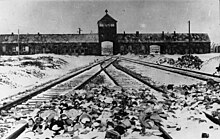Sophie's Choice (film)
Appearance

Sophie's Choice is a 1982 American romantic drama film that tells the story of a Polish immigrant, Sophie, and her tempestuous lover who share a boarding house with a young writer in Brooklyn. The film stars Meryl Streep, Kevin Kline, and Peter MacNicol. Alan J. Pakula directed the movie and wrote the script based on the novel of the same name by William Styron. It includes what is widely regarded as one of Streep's finest performances, for which she won an Academy Award for Best Actress.
Dialogue
[edit]


- Sophie: Stingo, you look... you look very nice, you're wearing your cocksucker.
- Stingo: That's my "seersucker."
- Nathan: Don't you see, Sophie? We're dying.
- Sophie: Mmm. You know, when you... when you live a good life... like a saint... and then you die, that must be what they make you to drink in paradise.
- Stingo: Don't you see? We are dying. I longed desperately to escape, to pack my bags and free, but I did not.
- Stingo: Leslie Lapidus could say fuck, but she could not do it.
- Nathan: You spent the whole fucking afternoon with him, or should I say, you spent the whole afternoon fucking him.
- Sophie: My mother, she's very sick, you know. And I can't do anything. But I think — if only I could have got — that meat for my mother it would make her strong. So I go to the country and er... the peasants were selling ham and I buy it with the black market money and I bring it back. But it's forbidden, you know, because all the meat goes to the Germans. So I sat on the train and I hid it under my skirt, I am pretending that I am pregnant, you know? Oh I was so afraid. I was shaking. And then the German, was in front of the train and he saw me. So he come over and take under my skirt that ham and... So they sent me Auschwitz.
- Stingo:You were sent to Auschwitz because you stole a ham?
- Sophie: No, I was sent to Auschwitz because they saw that I was afraid.
- SS officer: You're so beautiful. I'd like to get you in bed. Are you a polack? You! Are you also one of those filthy communists?
- Sophie: I am a Pole! I was born in Cracow! I am not a Jew. Neither are my children! They're not Jews. They are racially pure. I am a Christian. I am a devout Christian.
- SS officer: You are not a communist? You are a believer.
- Sophie: Yes sir, I believe in Christ.
- SS officer: You believe in Christ the redeemer?
- Sophie: Yes.
- SS officer: Did He not say... "Suffer the children, come unto me?" You may keep one of your children.
- Sophie: I beg your pardon?
- SS officer: You may keep one of your children. The other must go away.
- Sophie: You mean, I have to choose?
- SS officer: You are a Polack, not a Yid. That gives you a privilege, a choice.
- Stingo: This was not judgement day — only morning. Morning: excellent and fair.
Quotes about Sophie's Choice
[edit]
- Sometimes when you've read the novel, it gets in the way of the images on the screen. You keep remembering how you imagined things. That didn't happen with me during Sophie's Choice, because the movie is so perfectly cast and well-imagined that it just takes over and happens to you. It's quite an experience. … The movie, like the book, is told with two narrators. One is Stingo, who remembers these people from that summer in Brooklyn, and who also remembers himself at that much earlier age. The other narrator, contained within Stingo's story, is Sophie herself, who remembers what happened to her during World War II, and shares her memories with Stingo in a long confessional. Both the book and the movie have long central flashbacks, and neither the book nor the movie is damaged by those diversions, because Sophie's story is so indispensable to Stingo's own growth, from an adolescent dreamer to an artist who can begin to understand human suffering.
- We almost don't notice, at first, as Stingo's odyssey into adulthood is replaced, in the film, by Sophie's journey back into the painful memories of her past. The movie becomes an act of discovery, as the naive young American, his mind filled with notions of love, death, and honor, becomes the friend of a woman who has seen so much hate, death, and dishonor that the only way she can continue is by blotting out the past, and drinking and loving her way into temporary oblivion. … Sophie's Choice is a fine, absorbing, wonderfully acted, heartbreaking movie. It is about three people who are faced with a series of choices, some frivolous, some tragic. As they flounder in the bewilderment of being human in an age of madness, they become our friends, and we love them.
- Roger Ebert, in his review in The Chicago Sun-Times (1 January 1982)]
Cast
[edit]- Meryl Streep as Zofia "Sophie" Zawistowska
- Kevin Kline as Nathan Landau
- Peter MacNicol as Stingo
- Rita Karin as Yetta Zimmerman
- Stephen D. Newman as Larry Landau
- Josh Mostel as Morris Fink
External links
[edit]- Sophie's Choice quotes at the Internet Movie Database
- Sophie's Choice at Allmovie
- Sophie's Choice at Mojo
- Sophie's Choice at Rotten Tomatoes

